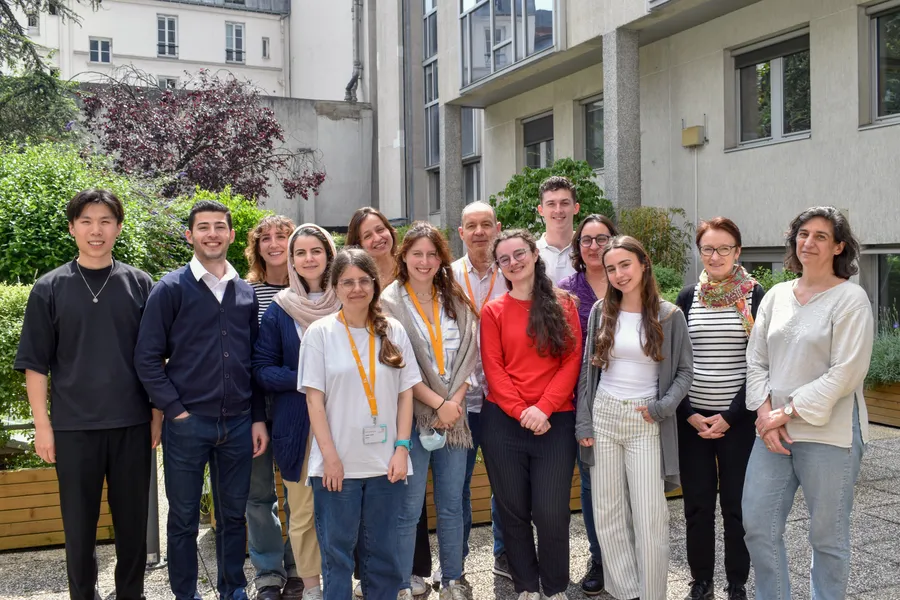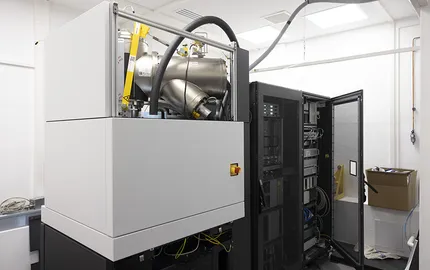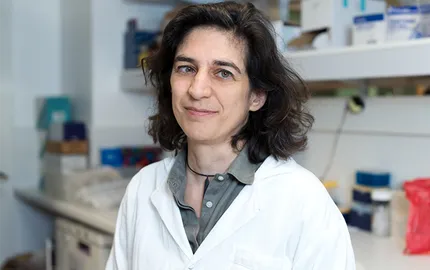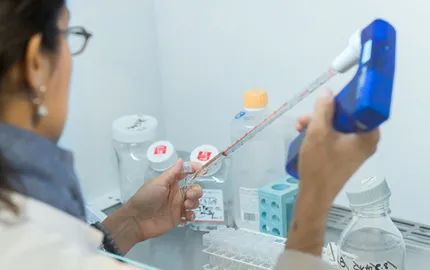Presentation

Cells release membrane-enclosed vesicles in their environment, collectively called “Extracellular Vesicles” (EVs), which are thought to act as intercellular messengers. Exosomes are a type of EV formed inside endocytic compartments, the multivesicular bodies (MVBs), and secreted upon the fusion of these MVBs with the plasma membrane. Other EVs, called microvesicles or ectosomes, are released by direct budding from the plasma membrane. The team is studying these different EVs: their biogenesis, the molecular mechanisms of their release and their functions, in the context of communication between tumors and the immune system.

Our group analyses the roles of EVs (containing exosomes and ectosomes, among other types) secreted by immune cells and tumor cells in the immune responses established during tumor progression. Our goal is to identify the specific functions of each type of EV, to ultimately exploit their therapeutic or biomarker potential in cancer.
To do so, we combine (1) cell biology approaches and quantitative and comparative proteomic analysis to identify protein markers and molecular mechanisms of formation, secretion and interaction with target cells, specific to the different types of EVs, (2) the use of these molecular tools in tumor and immune cell models in vitro and in vivo, to understand how controlling the secretion and composition of different types of EVs can modify anti-tumor immune responses and tumor progression, and (3) the analysis of EVs and their components as circulating biomarkers in delete breast cancer. We are also at the core of the EV research recommendations and best practice initiatives coordinated by the International Society of EVs (ISEV) (MISEV 2018: Thery*, Witwer*, J Extracell Vesicles 2018; MISEV2023: Welsh*, Goberdhan*, O'Criscoll*, ... Théry*, Witwer*, J Extracell Vesicles 2024), and we share our expertise with users of the EV-dedicated core facility we created at Institut Curie in 2021 (CurieCoreTech EV: https://institut-curie.org/platform/curiecoretech-extracellular-vesicles).
Our results in recent years include: the identification of protein markers common to different EVs or specific to some (Kowal, PNAS 2016), the demonstration that a protein used as a marker for EVs is instead a non-vesicular contaminant (Liao*, Martin-Jaular*, J Extracell Vesicles 2019), development of a novel unbiased approach to identify co-secreted proteins in EV subtypes and changes in these associations upon HIV infection (Martin-Jaular, EMBO J 2021: see interactive online tool http://evprofiler.institut-curie.org). We have demonstrated that some immune functions are common to multiple EV subtypes, and others specific (Tkach, EMBO J 2017). We proposed the use of EVs as decoys for SARS-CoV-2 (Cocozza*, Nevo*, Piovesana*, J Extracell Vesicles 2020). We developed tools to quantify the capture and transfer of EV contents into the cytosol of target cells (Bonsergent, Nat Commun 2021; Loconte, J Extracell Vesicles 2023), to visualize the trafficking of two different EV markers before they are released in some common and some different EVs (Mathieu, Nat Commun 2021), and to modulate the amount and content of released EVs (Grisard, J Extracell Vesicles 2022). We identified the unexpected presence of a macrophage-specific cytokine on EVs released by TNBC, which thus induces pro-inflammatory (M1-like) rather than M2-like macrophages, and are possibly anti-tumoral. We also recently evidenced the presence of endogenous retrovirus-derived particles in mouse tumor cell-derived EVs, which have different effects on immune cells than the non-viral EVs (Cocozza, EMBO J 2023).
















